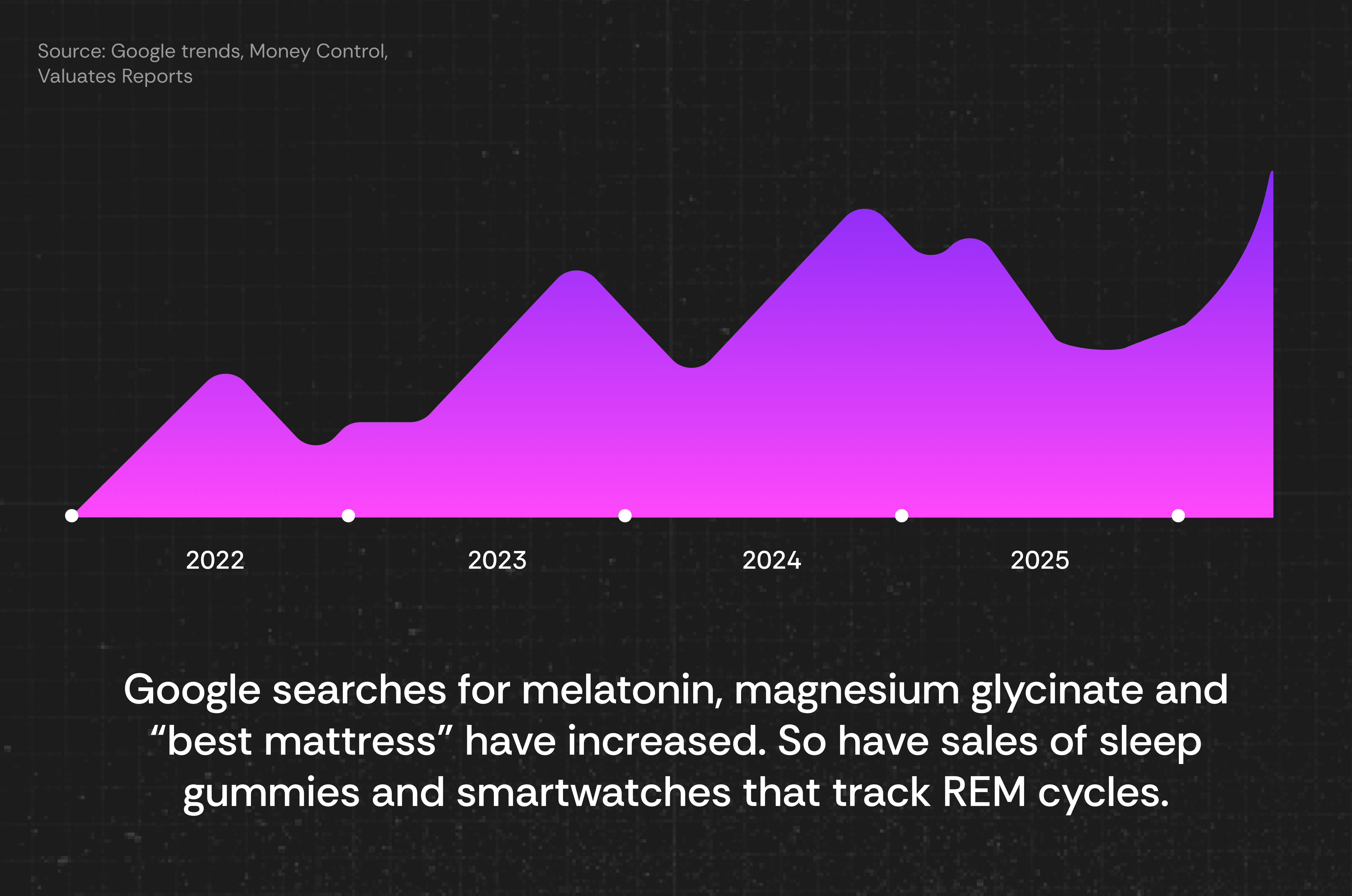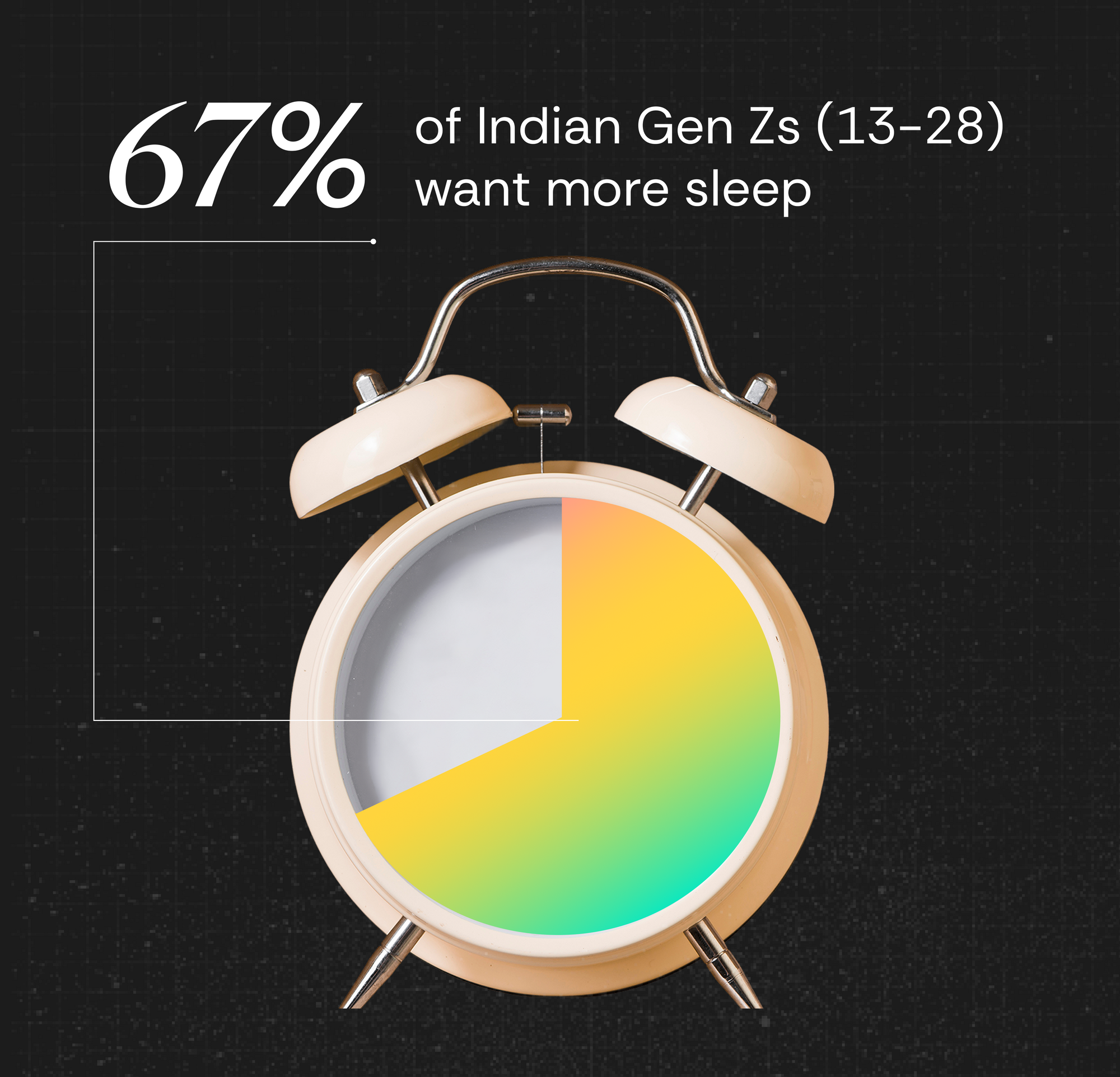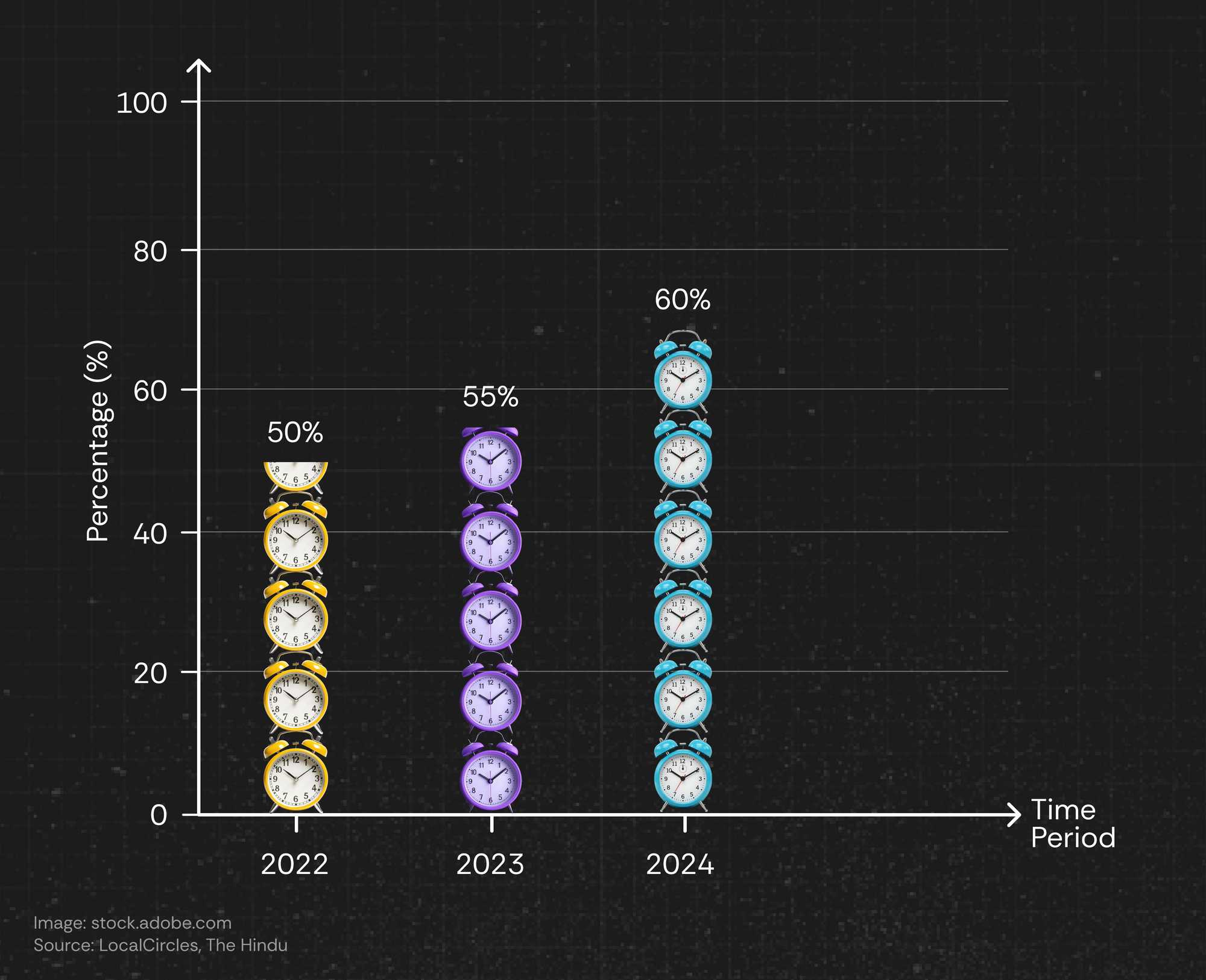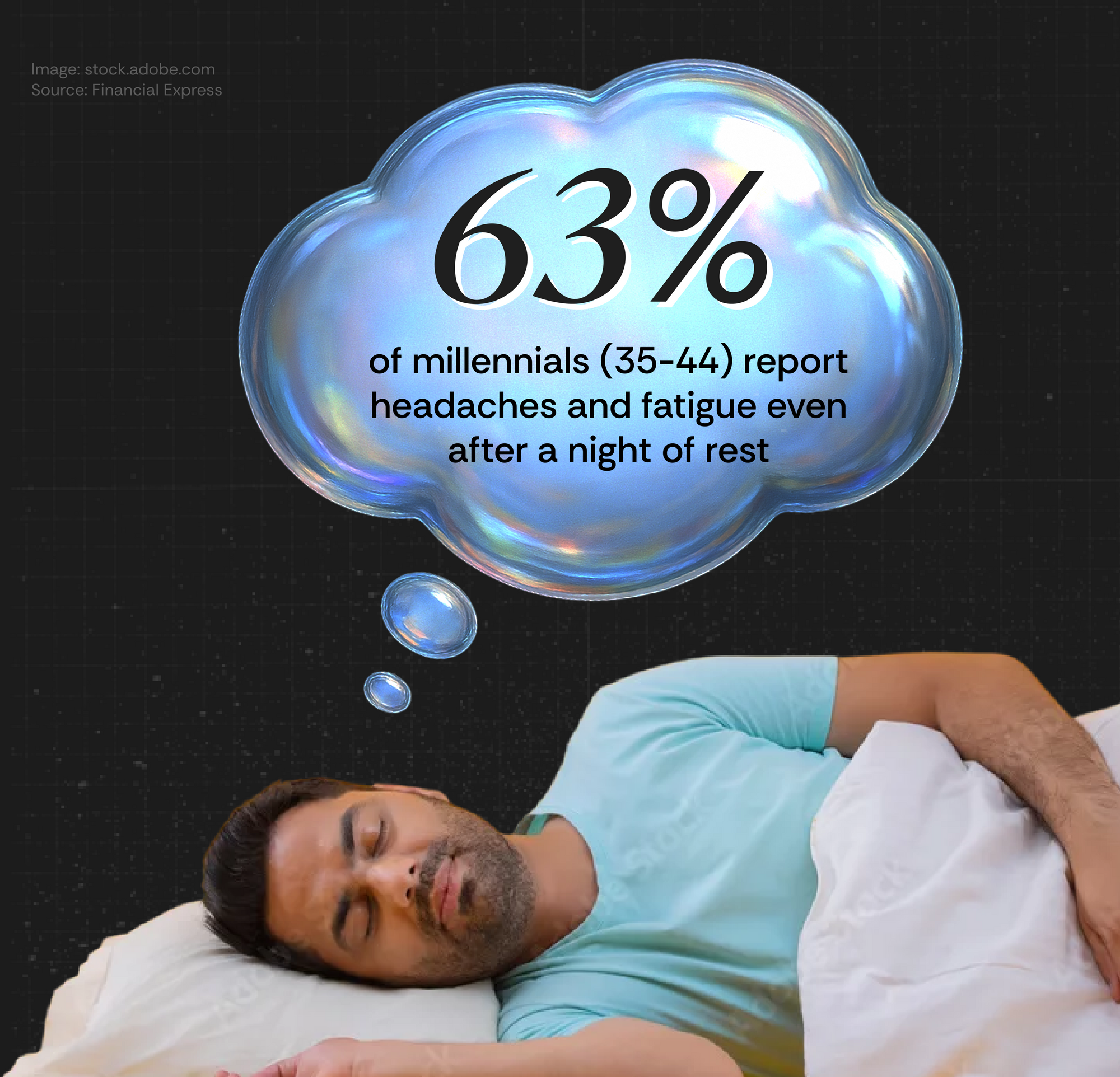Our ‘sleep economy’ is booming but gummies and gadgets are only bandaids that don’t address the hustle-culture lifestyle destroying rest in the first place.
By Shibani Mitra
TL;DR
- Over 60% of Indian Gen Zs and millennials admit they’re exhausted even after a full night’s sleep.
- India’s sleep economy is booming but sleep gummies, gadgets and hi-tech mattresses are only treating the symptoms of poor rest without addressing the hustle-culture lifestyle destroying it in the first place.
- India’s ‘rest revolution’ needs cultural leadership. Brands that move beyond quick fixes to reframe sleep as aspirational self-care can lead a long-overdue revolution in India.
‘Rest’ and ‘recovery’ are the hottest, trendiest wellness buzzwords right now. Mental health days, wellness retreats, melatonin gummies, sleep tracking – the vocabulary of slow living is everywhere. But let’s be real: Indians aren’t resting.
In the past two years, the percentage of Indians getting less than six hours of uninterrupted sleep has risen from 50% to 61%. But those with power over our sleep seem to have not woken up to this reality. Infosys co-founder Narayana Murthy declared, “Our youngsters need to work for at least 70 hours a week.” Even the Karnataka government is contemplating 12-hour workdays!
We want better sleep but refuse to change the hustle-culture lifestyle destroying it in the first place. Instead, we’re throwing money at jugaad solutions like smart mattresses, melatonin gummies, and trackers that help us optimise sleep… just so we can work harder the next day.
As India’s ‘sleep economy’ gathers momentum, we must ask ourselves: are we truly embracing rest or just trying to hack it?

SLEEP SHAMING STARTS AT HOME
Sleep is not sacred in India. We’re a country where kids are yelled at for sleeping in and adults brag about surviving on four hours a night. In fact, 67% of Indian Gen Zs (13-28) want more sleep and 63% of millennials (35-44) report headaches and fatigue even after a night of rest.
We’re taught to conflate sleep with laziness and rest with wasted time. From India’s punishing exam cycles to its ruthless corporate culture, sleeplessness is a proof of ambition, and seldom a cause for concern.
Even traditional rituals that value rest (like Goa’s susegad or Bengal’s bhaat ghoom) are often used as jibes – and sometimes an accusation for slow economic progress. Pop culture reinforces this: from Bollywood montages to LinkedIn humblebrags, even sports banter, our heroes are those who grind, sacrifice, and push through at all costs.
In Indian culture, exhaustion is a badge of honour.

WE’RE ONLY TREATING THE SYMPTOMS
India is the second-most sleep deprived country in the world. Our average sleep time is well under 8 hours. Google searches for melatonin, magnesium glycinate and “best mattress” as well as sales of sleep gummies and smartwatches that track REM cycles have increased. But we haven’t seen a proportional increase in rest because, let’s face it, we’re sleeping less and buying more.
We’re focused on treating the symptoms of poor sleep without addressing the deeper cultural beliefs and habits that created the crisis in the first place. And brands are complicit in this hustle-glorification.
Take Wakefit, the market leader in next-gen mattresses, or Vicks ZzzQuil, a fast-growing player in sleep aids, whose messaging isn’t about slowing down or changing lifestyles for the better – it’s about speeding up recovery. Wakefit’s hyperbolic “Andar ke bacche ko jagaa” promises a wake-up so full of zest, you greet the day with childlike energy. Vicks ZzzQuil, on the other hand, cues a wonderfully productive next day with its upbeat “Aapka din dhinak dhin.” [May your day be full of energy]
Across categories, the script remains the same: “Sleep well so you can seize tomorrow.” The protagonist? A tired, overworked corporate zombie who transforms into a recharged achiever after one “good” night’s sleep.

WE NEED TO FIX OUR BROKEN SYSTEMS
Sure, these early products in India’s sleep economy are a step in the right direction. They’re sharp, culturally-tuned propositions meeting the market where it is. Indians might not be ready to be told to slow down, but they’re open to sleeping smarter.
So, is some attention to sleep better than none? Is a quick-fix gummy better than ignoring rest altogether? Maybe. But bandaid solutions work best only when they buy us time to build better systems.
If sleep brands become an extension of our hustle-culture mindset, Indians will forever stay exhausted. Commercially, we also risk missing deeper opportunities and, more importantly, we will fail to address an urgent national health crisis.

RESHAPE HOW INDIANS THINK ABOUT REST
As India’s sleep category matures, the most impactful brands won’t just sell melatonin or memory foam pillows – they’ll reshape how Indians think about rest and rebrand sleep as an aspirational expression of self-care, not just as fuel for productivity.
IKEA India is already hero-ing the act of sleeping itself without selling its functional benefits, echoing the brand’s Swedish ethos where rest is integral to a good life. And just as LEGO championed the value of play, Sports England paved the way for women to lead more active lifestyles, and sanitary pad brands broke taboos, sleep brands now have the chance to rewrite the narrative and catalyse real behaviour change.This could look like education and awareness drives in schools that seed the value of rest and offer tools for time and stress management. Even high-pressure spaces like college campuses and corporate parks could be transformed with meditation rooms that normalise rest.
Brands could help shift our perspective from a reactive “work-life balance” to a more proactive, intentional rhythm that integrates rest as a non- negotiable in our daily lives, where the reward is not just a productive day at work, but a fulfilling and restful life.
So if you’re building a sleep-focused brand and strategising yet another gummy or app or smart pillow, please take a step back, think of the bigger role your brand can play in changing how we see rest, and just maybe… sleep on it?
Shibani Mitra is a creative brand strategist who thrives on the leap from powerful human insight to compelling brand actions. With over 13 years of experience, she has helped shape iconic brands across categories, from Hero MotoCorp and Castrol to Netflix, Amazon, Diageo, and Nestlé. Equal parts thinker and doer, her work spans brand positioning, innovation, and go-to-market strategy. Passionate about the power of advertising, Shibani believes in building impactful brands that don’t just sell but stand for something.
